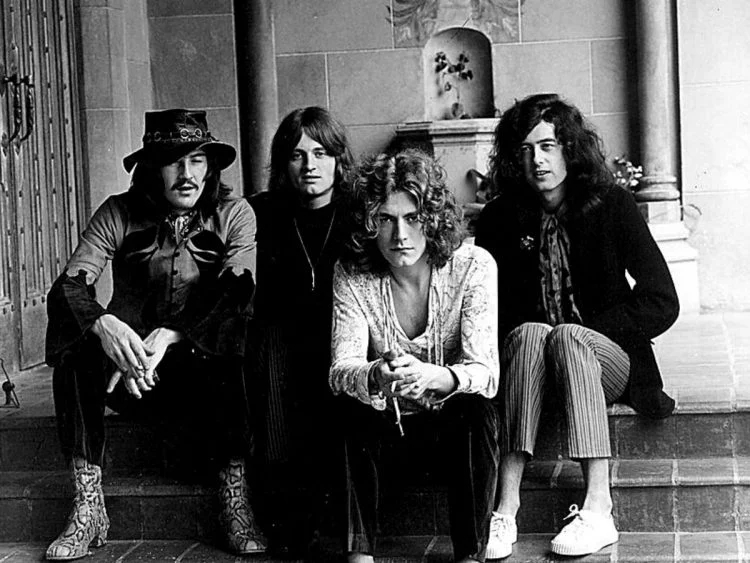⚡ The Roar of the North: Where Legends Awakened
It begins not with a whisper, but with a wail—a primal scream that pierces the silence like a Viking horn across stormy seas. That’s how Led Zeppelin’s “Immigrant Song” kicks in. But what many don’t know is that this iconic battle cry wasn’t born in London, L.A., or some hazy backstage jam session.
It was born in Iceland.
Cold. Stark. Mythic.
And it changed everything.
🇮🇸 The Frozen Spark: Why Iceland?
In June of 1970, Led Zeppelin had just become the biggest rock band on the planet. Their fame was astronomical, their shows apocalyptic, their image untouchable. And yet, for reasons both strategic and spiritual, they accepted an invitation to perform in Reykjavík, Iceland’s capital—a place far from the usual rock tour map.
It was part of a cultural exchange event organized by the British government. Zeppelin, already weary of predictable arenas and screaming teenage fans, saw something else: adventure.
That one-night concert in Iceland would ignite an idea in Robert Plant’s mind—one that fused Norse mythology, ancient landscapes, and modern rock fury.
🌋 Mountains, Myths, and the Madness of Inspiration
Stepping foot in Iceland was like entering a different realm for the band. It wasn’t just the landscapes—volcanic craters, glaciers, waterfalls—it was the sense of timelessness. For Plant, who had always been a lover of myth and epic tales, the country felt like a portal.
He and Jimmy Page reportedly traveled outside the city to explore Icelandic nature and folklore. They encountered sagas of Viking warriors, heard stories of gods and giants, and stood beneath skies so dramatic they could’ve been painted by Thor himself.
From these experiences came lyrics not of love or rebellion, but of conquest and storm:
“We come from the land of the ice and snow,
From the midnight sun where the hot springs flow…”
Those weren’t poetic metaphors.
They were literal translations of what they saw and felt in Iceland.

🎶 A Song Forged Like a Sword
When Led Zeppelin returned from Iceland, they headed straight to the studio. “Immigrant Song” was recorded just days later, and the result was nothing short of thunderous.
Unlike many Zeppelin tracks that evolved through live jamming or Page’s intricate compositions, this one was a bolt of lightning. Raw. Immediate. Almost prophetic.
Musically, the track is minimalist but fierce—built on a galloping rhythm and a haunting octave riff from Page. Bonham’s drums sound like war hammers. John Paul Jones keeps the bottom-end locked in with menace. And Plant?
Plant doesn’t sing. He summons.
The battle cry opening—his now-legendary “ah-AHHHH-ahhh!”—has become one of the most instantly recognizable vocal lines in rock history.
🛡️ Lyrical Lore: From Vikings to Valhalla
Most classic rock songs were about lust, loneliness, or rebellion. But Led Zeppelin’s “Immigrant Song” dared to tap into something more mythic. It spoke of Viking invasions, warrior gods, and battles not of the present, but of ages past.
“Hammer of the gods
Will drive our ships to new lands…”
These weren’t clichés. They were summoned from Icelandic sagas, infused with musical aggression that matched the scale of the legends.
Plant once said the song was a tribute to the Viking spirit—but it was also about the power of discovery. The “we” in the song weren’t just Norsemen. They were artists, rebels, travelers. Zeppelin saw themselves as musical conquerors, bringing thunder to every stage they touched.
📷 Capturing the Cold Flame: What Iceland Meant to Zeppelin
Though the Reykjavík concert didn’t attract headlines at the time, it became mythic in hindsight. There are only scattered photos and audio snippets from that performance, but its legacy was immortalized through “Immigrant Song.”
It became a gateway track for new Zeppelin fans—short, punchy, iconic. It opened Led Zeppelin III, a record that would take the band in bold new directions, from blues and folk to experimental rock.
More than that, the trip to Iceland marked a creative turning point. It showed Zeppelin that inspiration could come from anywhere—from the Arctic, from ancient tales, from lands most musicians never dreamed of playing.
🧊 Modern Legacy: From Vikings to Marvel
Decades later, “Immigrant Song” still carries that cold, wild energy. When Marvel’s Thor: Ragnarok used it in the film’s trailers and battle scenes, a new generation suddenly discovered the primal power of Zeppelin.
The sync was perfect. Gods, hammers, lightning—it was all there. But what made it even more fitting was the source of the song. Iceland had inspired gods and legends, and now Thor, a Norse god, was fighting to that same music.
And all of it—this cinematic, mythic resurgence—goes back to one cold night in Reykjavík.
🧠 Why It Matters: The Power of Place in Music
Led Zeppelin’s Icelandic epiphany is more than just a cool trivia fact. It’s a reminder of something deeper: where you go matters.
It tells us that geography, culture, and emotion fuse together in ways we can’t always predict. That stepping outside of the expected—taking a risk, flying to a strange land, breathing a different sky—can spark art that lasts for generations.
Led Zeppelin didn’t go to Iceland to write a hit.
They went because they were curious.
And what they brought back was lightning in a bottle.
📣 Social Media Caption Ideas
- “When Led Zeppelin went to Iceland, they didn’t just play a gig. They summoned the gods. ⚡🎸 #ImmigrantSong #ZeppelinLore”
- “Fact: The iconic scream in Led Zeppelin’s ‘Immigrant Song’ was born in Iceland. Viking energy, pure and raw. 🛡️🔥”
- “The land of fire and ice inspired one of rock’s most legendary songs. Zeppelin + Iceland = magic. 🎶🇮🇸 #MusicHistory #LedZeppelin”

🏁 Final Thoughts: An Anthem Carved in Ice
Led Zeppelin’s “Immigrant Song” remains a timeless anthem—not just because of its riff or its scream, but because of its origin story. A song born from travel, awe, and reverence for a land that felt ancient and alive.
In an industry often fueled by fame, drugs, and deadlines, this track came from something purer: wonder.
So the next time you hear that first scream cut through the silence, remember the mountains, the mist, the myth—and the moment a British rock band stood in Iceland and felt the sky open.
Because some songs aren’t just written.
Some are forged.


